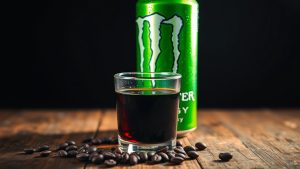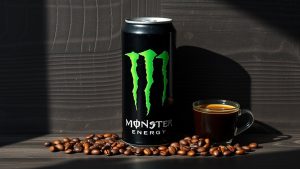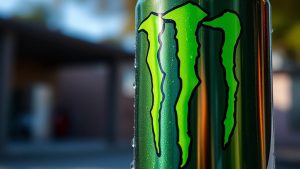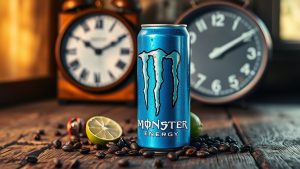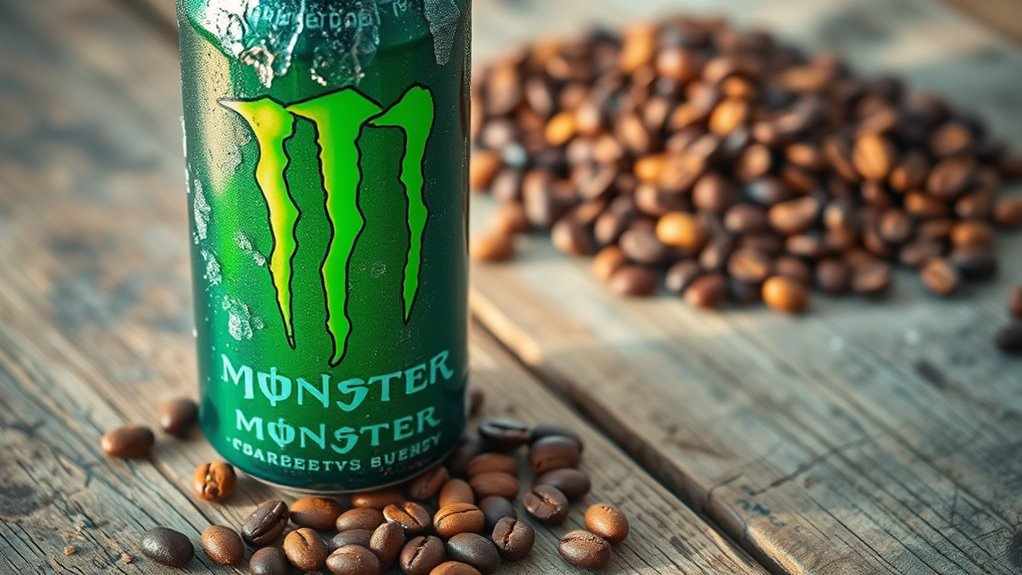
A 16 oz can of Monster Energy contains about 160 mg of caffeine, which is roughly equivalent to two strong cups of coffee. This caffeine level places Monster in a competitive position among energy drinks, offering a decent energy boost without excessive amounts. While this is a safe amount for most adults, excessive intake can lead to health issues. If you're curious about the full range of caffeine content in different flavors and their impacts, there's more to explore.
Have you ever wondered how much caffeine is in a Monster drink? If you've reached for a 16 oz can of Monster Energy, you're consuming about 160 mg of caffeine. This amount is roughly equivalent to two strong cups of coffee, with each cup containing around 80 mg of caffeine. For many, this caffeine content makes Monster an appealing choice when you need an energy boost. However, it's important to reflect on how this fits into your daily caffeine consumption.
When you think about other energy drinks, Monster's caffeine level is fairly competitive. For example, Red Bull contains only 80 mg of caffeine per 8.4 oz can, which is considerably less than Monster. Meanwhile, Rockstar offers a range of caffeine content, typically between 160 to 240 mg per 16 oz can, while Bang Energy stands out with a hefty 300 mg per can. If you're choosing a Monster, you're likely aware that it sits solidly in the middle of this spectrum, providing a decent jolt without going overboard—at least with the standard flavors.
That said, some specific flavors, like Java Monster, can contain up to 300 mg of caffeine. With the recommended daily limit for caffeine being 400 mg, a single can of Java Monster can push you close to that cap. It's important to keep track of your overall intake, especially since exceeding this amount can lead to adverse effects like a fast heart rate and sleep disturbances. Monster Energy also includes other stimulants beyond caffeine, such as taurine, which may improve athletic performance.
Moreover, it's necessary to reflect on the other ingredients in Monster drinks. Original Monster contains a staggering 57 grams of sugar, along with other components like taurine and ginseng, which may have their health implications. For those looking to cut sugar, Monster does offer sugar-free options, such as Zero Ultra, which utilize artificial sweeteners instead.
As you evaluate your caffeine consumption, remember that caffeine acts as a stimulant by blocking adenosine receptors in your brain, which can create a temporary feeling of alertness. However, excessive intake can lead to serious health risks, especially if you have pre-existing conditions. Most adults typically consume about 193 mg of caffeine daily, so a can of Monster contributes considerably to that total.
Regulatory perspectives also matter. In the U.S., the FDA has received reports of health issues related to Monster Energy, although no causal link has been found. In Europe, the European Food Safety Authority generally considers typical consumption of these drinks to be safe. However, in India, Monster faced a ban due to its high caffeine and ginseng content, highlighting differing regulatory views worldwide.
Ultimately, understanding the caffeine content in your Monster drink is crucial for making informed choices. Always read labels to grasp not just caffeine levels but also other ingredients. Moderation is key to enjoying energy drinks without falling prey to potential health risks.
Conclusion
When it comes to caffeine in Monster drinks, you're often looking at about 160 mg per 16 oz can, depending on the specific variety. While that may give you a quick boost, it's crucial to remember that moderation is key. Too much caffeine can lead to jitters or other health issues. So, as the saying goes, "don't bite off more than you can chew." Stay informed and enjoy your energy drinks wisely to keep your health in check.
